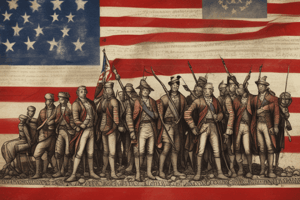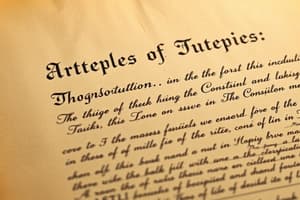Podcast
Questions and Answers
What were the Articles of Confederation, and why did this document fail?
What were the Articles of Confederation, and why did this document fail?
The Articles of Confederation was a document that set up the first government of the United States. This government was too weak; it did not have power to collect taxes, regulate trade, or draft soldiers into an army.
What were the main differences between the Articles of Confederation and the Constitution?
What were the main differences between the Articles of Confederation and the Constitution?
Under the Articles of Confederation, Congress was the only branch, while the Constitution established three branches. The Articles did not allow for a Bill of Rights, while the Constitution did. The Constitution allowed for the regulation of trade, and it permitted the collection of taxes and drafting of soldiers, which the Articles did not.
What were the Federalist Papers?
What were the Federalist Papers?
The Federalist Papers were a series of articles written in New York newspapers in support of the proposed Constitution by James Madison, Alexander Hamilton, and John Jay.
What were the 3 main ideas expressed in the Federalist Papers about how the Constitution set up a strong government that preserved freedom?
What were the 3 main ideas expressed in the Federalist Papers about how the Constitution set up a strong government that preserved freedom?
Why do people today think the Federalist Papers are important?
Why do people today think the Federalist Papers are important?
What did Alexander Hamilton mean by judges needing an 'independent spirit'?
What did Alexander Hamilton mean by judges needing an 'independent spirit'?
Why did the Federalists oppose the Bill of Rights?
Why did the Federalists oppose the Bill of Rights?
How did the Bill of Rights get added to the Constitution?
How did the Bill of Rights get added to the Constitution?
Why did the Anti-Federalists oppose the Constitution, and what was their strongest point?
Why did the Anti-Federalists oppose the Constitution, and what was their strongest point?
Flashcards are hidden until you start studying
Study Notes
Articles of Confederation
- Established the first government of the United States, but proved ineffective due to lack of power.
- Inability to collect taxes, regulate trade, or draft soldiers crippled its effectiveness.
Constitution
- Created a more robust framework with three branches of government: legislative, executive, and judicial.
- Allowed Congress to regulate trade and collect taxes, addressing the weaknesses of the Articles of Confederation.
- Demand for a Bill of Rights emerged due to concerns about potential government overreach.
Federalist Papers
- A collection of articles advocating for the ratification of the Constitution, authored by James Madison, Alexander Hamilton, and John Jay.
- Aimed to clarify the intentions of the Constitution's framers and promote its acceptance.
Key Ideas in Federalist Papers
- Established a federal government that delineated powers between the national and state governments.
- Introduced a separation of powers among the three branches to ensure no single entity gains excessive control.
- Advocated for a republic, emphasizing the concept of accountability to the people.
Importance of Federalist Papers
- Crucial in garnering support for the Constitution's adoption.
- Provided insights into the framers' thoughts and design of the government.
Alexander Hamilton on Judicial Independence
- Advocated for judges to remain free from political influence, enabling impartial interpretation of the law.
Federalists' Opposition to Bill of Rights
- Argued that a limited government structure rendered a Bill of Rights unnecessary, as it would not infringe upon individual rights.
Addition of the Bill of Rights
- States consented to ratify the Constitution only if a Bill of Rights was promised.
- James Madison played a pivotal role in crafting proposed amendments, leading to the adoption of the first ten amendments.
Anti-Federalists' Opposition
- Believed the Constitution established a government that was too powerful and threatened individual freedoms.
- Criticized the Constitution for its focus on government structure rather than protecting citizens' rights.
Studying That Suits You
Use AI to generate personalized quizzes and flashcards to suit your learning preferences.





